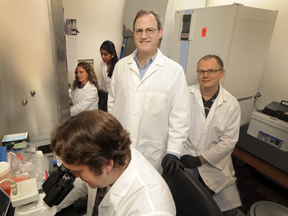Research Interests of Our Laboratory

|
|
|
• Molecular mechanisms of mRNA transport and local protein synthesis in neurons
• Role of microRNAs in regulation of local mRNA translation in neurons
• Function of local mRNA regulation in axon guidance, synaptic plasticity and neural repair
• Reversible mechanisms of translational repression by the Fragile X messenger ribonucleoprotein (FMRP).
• Role of the survival of motor neuron protein SMN in mRNP assembly and localization
• Dysregulation of local mRNA regulation in mouse models of fragile x syndrome (FXS) and spinal muscular atrophy (SMA)
• Cooperative interactions between FMRP and microRNAs at the synapse
• Targeting the PI3K signaling complex as a therapeutic strategy for fragile x syndrome
• Center for Collaborative Research in FXS
The main research interests of our laboratory are to understand the mechanisms and functions of mRNA transport and local protein synthesis in neurons of the central and peripheral nervous system. We are using in vitro and in vivo models of synaptic activity and nerve injury, as well as mouse models of neurological diseases, to assess the function of mRNA regulation in axon guidance, nerve regeneration and synaptic plasticity. We have a long-standing interest in the basic mechanism, regulation and function of mRNA localization and local translation in axonal growth cones and dendritic spines. For several years we have been interested how impairments in local mRNA regulation may underlie spinal muscular atrophy (SMA) and fragile x syndrome (FXS), two inherited neurological diseases affecting children. Efforts are also underway to evaluate different therapeutic modalities in these mouse models and human induced pluripotent stem cell iPSC derived neurons. Our research utilizes a multi-disciplinary approach that involves primary neuronal culture, brain/nerve micro-dissection, viral vectors, fluorescently tagged mRNA and proteins, fluorescence live-cell imaging, and molecular and biochemical methods to isolate and characterize RNA-protein interactions. These studies will provide new insight into molecular and cellular mechanisms important for neuronal development and plasticity, as well as to develop therapeutic strategies to intervene in neurological diseases.


